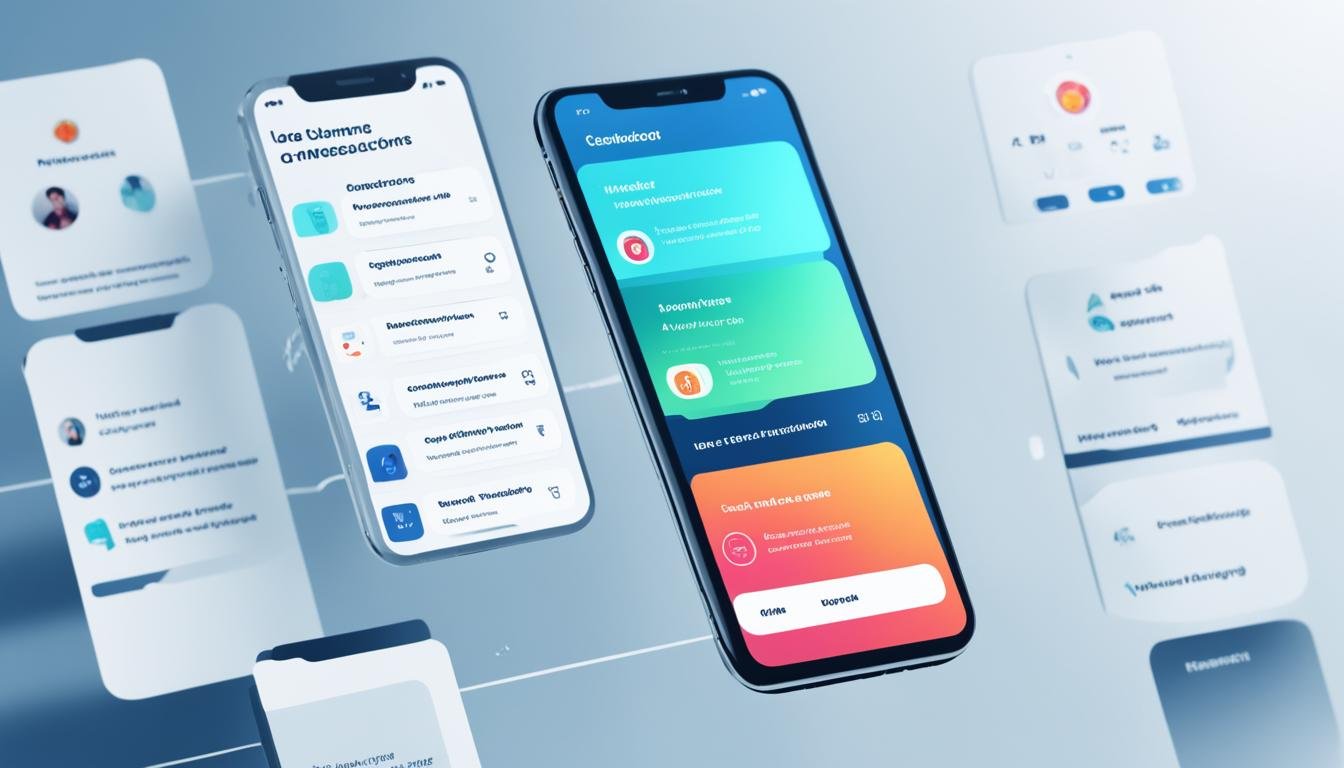Heads up – This post includes affiliate links. If you click and purchase, I may received a commission at no extra cost to you. I only recommend products which I have personally vetted.
AI is revolutionizing marketing. It creates personalized experiences that captivate audiences and boost conversion rates. AI-powered strategies can transform your marketing campaigns.
Picture marketing that speaks to each customer individually. It anticipates their needs and offers tailored solutions. This is the power of AI personalization.
With AI, your brand can build strong connections with your target audience. It helps create unbreakable bonds between your company and customers.
Key Takeaways
- AI-powered personalization enables unprecedented levels of customer engagement and brand loyalty.
- Leveraging AI for targeted advertising and predictive modeling can significantly boost conversion rates.
- Integrating AI into your marketing automation can optimize resource allocation and reduce operational costs.
- Consistent customer experiences across multiple channels are achieved through AI-driven brand voice and quality control.
- AI’s data-driven insights empower you to make informed decisions and adapt to evolving customer needs.
Understanding AI-Powered Personalization
AI-Powered Personalization is reshaping marketing strategies. It uses artificial intelligence to create tailored experiences for consumers. AI algorithms analyze user data to deliver personalized content and recommendations.
This innovative approach taps into customer preferences and behaviors. It forms the basis for highly targeted marketing efforts. AI-powered personalization is transforming how businesses connect with their audience.
What is AI-Powered Personalization?
AI-powered personalization uses advanced tech to analyze user data. It provides customized content, products, and services to customers. This method goes beyond traditional data analysis.
Marketers can now offer unique experiences for each customer. These experiences cater to specific needs and interests. It’s a dynamic way to engage with consumers.
The Role of Data Analytics and Machine Learning
- Data Analytics: The cornerstone of AI-powered personalization is the collection and analysis of vast amounts of customer data, including demographics, browsing history, purchase behavior, and social media interactions.
- Machine Learning: Advanced AI algorithms process this data to uncover patterns and insights, enabling marketers to create personalized strategies that resonate with individual consumers.
Data Analytics and Machine Learning unlock the potential of AI-Powered Personalization. They help businesses deliver exceptional customer experiences. This approach drives measurable results in Personalized Marketing.
Benefits of AI Personalized Marketing
AI-powered personalization in marketing offers significant benefits. It creates deeper customer connections, boosting engagement with your brand. Personalized recommendations lead to higher conversion rates. Customers feel valued, increasing loyalty and lifetime value.
Studies reveal consumer expectations for personalized marketing. 63% of consumers expect personalization as standard. 45% are less likely to buy after a non-personalized experience. 27% would stop using a brand without personalization.
| Benefit | Impact |
|---|---|
| Increased Customer Engagement | Personalized experiences resonate with customers, leading to higher interaction and loyalty. |
| Higher Conversion Rates | Recommendations based on individual preferences result in more relevant and appealing offers. |
| Improved Customer Loyalty | Personalization makes customers feel valued, increasing retention and lifetime value. |
AI technology analyzes vast amounts of data to personalize marketing messages. It optimizes campaigns in real-time for better results. Advanced natural language programming enhances search capabilities.
AI-based marketing personalization delivers tailored content to each customer. It learns and adapts to preferences, improving engagement. This approach leads to a better return on investment (ROI).
Key Components of AI Personalization
AI personalization uses essential tools to deliver tailored experiences. These include Customer Data analysis, Audience Segmentation, and Recommendation Engines. These components transform how businesses interact with customers.
Customer Data Collection and Analysis
Customer data analysis is crucial for AI-powered personalization. Advanced algorithms process user data to understand individual preferences and behaviors. This approach helps businesses create personalized content and experiences for each customer.
Data sources include browsing history, purchase patterns, and demographic information. With these insights, companies can tailor their offerings to meet specific customer needs.
Audience Segmentation
AI-driven audience segmentation groups users based on shared traits and preferences. This process uses insights from customer data analysis. Segmentation allows for more targeted and effective personalization strategies.
By categorizing customers, businesses can deliver relevant content and recommendations. This approach ensures each user receives engaging and personalized experiences.
Recommendation Engines
Recommendation engines are central to AI personalization. They suggest products, services, or content based on user behavior and preferences. These engines have revolutionized platforms like Alibaba, Amazon, Netflix, and Spotify.
Integrating these AI personalization components creates unique customer experiences. This approach leads to increased engagement, higher conversion rates, and improved loyalty. Businesses can build stronger connections with their customers through personalized interactions.
Dynamic Content Delivery
Smart marketers use Dynamic Content Delivery to create personalized experiences for customers. They use Personalized Emails and Tailored Website Experiences to connect with their audience. This approach helps drive more conversions and builds stronger relationships.
AI techniques boost conversion rates through custom user experiences. They enable efficient data management and adapt to user preferences. This personalization leads to higher conversions and increased customer loyalty.
Personalized Emails and Messaging
AI tools generate custom content at scale, saving time and resources. They analyze user data to deliver targeted messages. This boosts user engagement and conversion rates.
- AI writing assistants like Jasper can generate blog posts, social media updates, and emails tailored to individual preferences and behavior.
- Companies like The Associated Press and e-commerce platforms are using AI for content creation, optimizing personalization and improving user experience.
Tailored Website Experiences
AI-powered dynamic content creates personalized website experiences. It adapts to user preferences and behavior. Marketers use data analytics to show content that matches visitors’ interests.
- AI can analyze user data to identify patterns and trends, leading to improved audience targeting and higher engagement rates.
- E-commerce websites using AI for real-time personalization can increase the chances of purchase by recommending products based on current user behavior.
- AI can provide personalized recommendations, enhancing user experience and boosting user satisfaction and loyalty.
AI-driven Dynamic Content Delivery is becoming crucial for businesses. It helps them stay competitive and offer exceptional experiences. Personalized Emails and Tailored Website Experiences are key to this approach.

Predictive Analytics and Behavior Modeling
Predictive analytics and behavior modeling are changing marketing. They help brands predict customer needs and create personalized experiences. This approach uses data, AI, and machine learning to boost engagement and sales.
AI predictive analytics offers data-driven insights for better marketing. It improves customer segmentation, personalization, and campaign results. These models can predict future customer actions, like buying habits and content likes.
Marketers use this info to create targeted strategies. These strategies connect with individual customers. As a result, conversion rates and customer loyalty improve.
| Key Benefits of Predictive Analytics | Predictive Analytics in Action |
|---|---|
|
|
Predictive analytics is growing fast. It’s crucial to balance tech use with ethics and privacy. Responsible data handling builds customer trust.
This approach allows marketers to use Predictive Analytics, Behavior Modeling, and Customer Behavior Prediction effectively. The result? Personalized experiences that boost business success.
AI Personalized Marketing Strategies
AI-powered personalized marketing is reshaping the digital landscape. It boosts conversions and customer engagement for businesses. AI-powered personalized marketing uses two key approaches: Omnichannel Personalization and Conversational AI.
Omnichannel Personalization
AI-driven omnichannel personalization creates tailored customer experiences across multiple touchpoints. It analyzes customer data to predict preferences and behaviors. This allows businesses to craft targeted marketing messages that resonate deeply.
Conversational AI and Chatbots
Conversational AI chatbots engage customers in real-time, personalized dialogues. They provide instant support, recommendations, and transactional capabilities. Chatbots work across various communication channels, ensuring consistent customer experiences.
AI-driven personalization boosts customer engagement and conversion rates. It significantly improves overall marketing effectiveness for businesses that embrace these strategies.
| Metric | Without AI | With AI |
|---|---|---|
| Email Open Rate | 21% | 30% |
| Monthly Targeted Emails | 100 | Over 100 |
Integrating AI into Marketing Automation
AI and marketing automation are revolutionizing business strategies. This powerful combo enables personalized, targeted, and efficient marketing campaigns. Personalized Marketing Automation leverages AI’s dynamic nature to streamline efforts and achieve remarkable results.
AI integration offers real-time analysis of vast customer data. Algorithms identify patterns, predict behavior, and deliver personalized content to each consumer. This approach boosts customer engagement, conversion rates, and loyalty.
AI-powered automation handles repetitive tasks like lead qualification and email sending. Marketing teams can focus on strategic initiatives. The system constantly learns and adapts, ensuring relevance and effectiveness over time.
Challenges exist in AI integration with marketing automation. Data privacy, algorithm bias, and transparency are crucial considerations. However, the potential for AI Integration to transform Marketing Automation is undeniable.
The future of marketing automation lies in seamless AI integration. This combination unlocks personalized, efficient, and scalable marketing strategies. Businesses can gain a competitive edge and deliver exceptional customer experiences.
Ethical Considerations and Privacy Challenges
AI-powered personalization in digital marketing brings ethical and privacy concerns. Data privacy and security are crucial for consumer trust. Brands must be open about data usage and follow regulations like GDPR and CCPA.
Algorithmic bias is another challenge. AI can unintentionally spread biases from training data. This can lead to unfair product recommendations and marketing decisions. Marketers must watch their AI systems closely to ensure fair treatment for all customers.
Data Privacy and Security
Collecting customer data for personalization can risk individual privacy. Businesses need strong data security measures like encryption and access controls. They must also have good cybersecurity protocols to protect sensitive information.
Earning consumer trust through clear data usage practices is vital. This helps keep AI-powered marketing strategies effective.
Algorithm Bias and Transparency
Bias and discrimination in AI-driven marketing can have far-reaching consequences, potentially disadvantaging certain demographic groups and undermining the fairness of personalized recommendations. Companies must involve diverse groups when developing and testing AI algorithms. This helps spot and fix potential biases.
Transparency in decision-making is crucial. Customers want to know how their data creates personalized content and offers.
Businesses must focus on ethics and privacy as AI use grows. Protecting data, reducing bias, and being open builds trust. This approach lets marketers use AI while keeping consumer trust and social well-being.

The Future of AI Personalized Marketing
AI-powered personalization is revolutionizing marketing. New technologies like Augmented Reality (AR), Virtual Reality (VR), and blockchain are creating immersive experiences. These advancements enhance data security and allow customers to interact with products in innovative ways.
Improved AI algorithms are leading to more precise personalized marketing strategies. Brands are focusing on ethical considerations. They aim to ensure fairness, transparency, and respect for user privacy.
Emerging Technologies and AI Integration
Innovative tech is reshaping personalized marketing. AR and VR offer unique product interactions. Blockchain enhances data security and builds trust between brands and consumers.
Continuous Improvement of AI Algorithms
- Advancements in machine learning and data analytics enable more accurate personalized campaigns.
- Addressing algorithm bias and ensuring privacy protection are crucial as AI Algorithm Improvement progresses.
- Brands are investing in upskilling marketing teams to leverage AI-powered personalization tools effectively.
The Future of AI Personalized Marketing is transforming brand-customer relationships. Emerging technologies and refined AI algorithms are creating personalized experiences. These advancements drive higher engagement, loyalty, and conversions.
Conclusion
AI-powered personalization has revolutionized marketing. It uses data analytics and machine learning to deliver targeted experiences. This approach resonates with customers on a personal level.
AI enhances email campaigns, website content, and behavior modeling. It also powers chatbots for better customer interaction. These techniques boost engagement, conversion rates, and loyalty.
Studies show that 80% of consumers prefer personalized experiences. This makes them more likely to do business with such companies.
The path to AI-powered marketing faces challenges like data privacy and algorithm bias. However, the future looks promising. As technology evolves, marketers can refine their AI strategies.
AI personalization has the potential to redefine customer-brand relationships. It can help achieve unprecedented success. By embracing AI, you can deliver the tailored experiences your customers desire.
FAQ
What is AI-powered personalization in marketing?
How does AI enable personalized marketing strategies?
What are the benefits of AI personalization in marketing?
What are the key components of AI-powered personalization?
How can AI be used for dynamic content delivery?
How can AI predict future customer behavior?
What are some emerging AI personalized marketing strategies?
How can AI be integrated with marketing automation?
What are the ethical considerations and privacy challenges with AI personalization?
What is the future of AI-powered personalization in marketing?
Heads up – This post includes affiliate links. If you click and purchase, I may received a commission at no extra cost to you. I only recommend products which I have personally vetted.





Leave a Reply